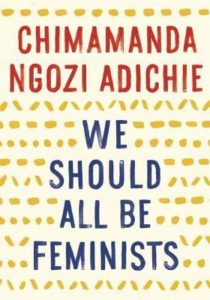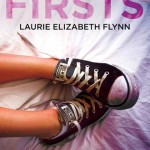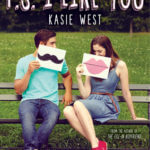Book Buddies is a discussion-style review that takes place with one of my two buddies. (Learn more and see past reviews here) We both read the book and then have a private discussion about it. We post our discussion as a review on the last Wednesday of each month. You’ll be able to see our similar/different opinions on the overall book, characters, writing style, etc. – just like a regular review. The first half our discussion will take place right here, and the second half will be on Cristina’s blog! (Link at the bottom)

 We Should All Be Feminists by Chimamanda Ngozi Adichie
We Should All Be Feminists by Chimamanda Ngozi Adichie
on February 3rd 2015
(48 pages) • Goodreads • Amazon • Barnes & Noble 
What does “feminism” mean today? That is the question at the heart of We Should All Be Feminists, a personal, eloquently-argued essay—adapted from her much-viewed TEDx talk of the same name—by Chimamanda Ngozi Adichie, the award-winning author of Americanah and Half of a Yellow Sun. With humor and levity, here Adichie offers readers a unique definition of feminism for the twenty-first century—one rooted in inclusion and awareness. She shines a light not only on blatant discrimination, but also the more insidious, institutional behaviors that marginalize women around the world, in order to help readers of all walks of life better understand the often masked realities of sexual politics. Throughout, she draws extensively on her own experiences—in the U.S., in her native Nigeria, and abroad—offering an artfully nuanced explanation of why the gender divide is harmful for women and men, alike. Argued in the same observant, witty and clever prose that has made Adichie a bestselling novelist, here is one remarkable author’s exploration of what it means to be a woman today—and an of-the-moment rallying cry for why we should all be feminists.
View Cristina’s part of the discussion here.
I think Adichie did a wonderful job of “summarizing” exactly what she set out to – why we should all be feminists. Do you think she did a good job of highlighting enough key points so non-feminists or even anti-feminists could understand how harmful that viewpoint can be?
Cristina: I agree, I think Adichie did a great job at using accessible language and examples in order to get her point across. For me, it was a good refresher of the basic principles I learned in my women’s studies classes in college, and I found myself filling in the blanks with more of the in depth readings and research I did. I think for someone who has not encountered feminism before, or who has not thought too critically about it, her piece not only outlines the concept but illustrates it in a way that feels truly like a conversation, and resonates on a human level- such as her examples of not being able to access basic privileges (like entering certain restaurants in Nigeria) as a solo female. Sometimes a conversational format with simple, personal experiences as evidence is the best way to present a concept that has become such a large movement and steeped in all kinds of complex theory. While I don’t know if it would be enough to “convince” an anti-feminist, I think it really brings the concept back to its basics in a way that I think most people could empathize with.
Lauren: Exactly – a refresher of the basics! Completely agree with that. I mentioned on your post that the essay was a good confirmation of my beliefs. It didn’t alter my opinions (like I hope it would for non-feminists who give it a read!), but it strengthened and reconfirmed them. I think her examples of her friends in America as well as her experiences and friends in Nigeria make some great points. You’re right – hopefully anyone would at least be able to empathize and see a little bit more about how it’s important (or not a myth!). If there was a bit more inside besides the personal essays, I think there would be a really strong argument. This is a nice “introduction to feminism and why it’s important,” so I appreciated that it could help people who are interested but don’t know. I’m always seeking simple quotes and passages to share on International Women’s Day or other days so people I personally know can understand why feminism is important. There are a lot of bits and pieces of this essay that I could easily see myself sharing in one of those instances.
I found myself highlighting so many passages within this short essay as a result of my previous question. What passage or quote did you find the most powerful, if you have it handy? Or, which “story” that she shared impacted you the most?
Cristina: I think since I have quite a bit of experience with feminist and gender based texts, the portions that I felt were powerful were not the ones focused on defining feminism or illustrating oppression against women, but rather her blunt explanation of how men suffer from our oppressive, binary gender system as well, and how the goals of feminism therefore are beneficial to all. Adichie states: “We do a great disservice to boys in how we raise them. We stifle the humanity of boys. We define in a very narrow way. Masculinity is a hard, small cage, and we put boys inside this cage” (19). This really resonated with me because I’ve seen how my male friends have been locked into their own gender-based oppression by being told to not be emotional, to not express their feelings or have interests that go beyond the typical aggressive of physical “traditional” male interests. I think the points Adichie makes help to make feminism be more inclusive of how it can help deconstruct systems of oppression against women that are ALSO harmful to males, which I think is a really important piece of advice to remember, that feminism’s goals ultimately help so many more groups besides females.
Lauren: I definitely agree. Defining feminism isn’t necessary for me personally, but it was nice to have little sound bites I could share if arguing with one of my ignorant friends about the issue; many people in my life don’t see the point of it, so I like to have information to share if they try to argue with me about it. Sad but true! I loved the quote you chose as well; men are definitely victims of this system. This goes into my next question about feminism vs. humanism because many people think that feminism is a non-inclusive word, especially because feminists also say how it benefits men. I like the parts where she says “We teach females that in relationships, compromise is what a woman is more likely to do. We raise girls to see each other as competitors— not for jobs or accomplishments, which in my opinion can be a good thing— but for the attention of men. We teach girls that they cannot be sexual beings in the way boys are” (31-32). The whole virgin-slut dichotomy is incredibly frustrating and it’s something we see every day online, in the media, and in everyday conversations. I’ll never understand how people think it’s okay to pit men and women against each other, or even women against each other.
One of the biggest arguments against the word “feminism” is that it should be “humanism” or something similar, if it really is about equality and not just women. What do you think of this debate? How well do you think Adichie explained her point of view on this (around page 41)?
Cristina: This is a very tricky subject, as I really see both sides of the argument, and I think it’s an argument that crops up around any type of social justice movement (such as “Black Lives Matter vs. “All Lives Matter” etc.). I think that at its core, feminism does want to promote equality for all, but the title is indicative of the method- that the promoting of well being for all is done specifically through the movement to address women’s issues. I think Adichie did a fair job of explaining it as a movement that’s based through the lens of a specific group’s history of oppression, and that taking away the word in exchange for “humanism” would ignore the history that’s so important to the feminist movement.
Lauren: Yeah exactly – I had an argument with my sister and stepmom about “All Lives Matter” the other day that left me so baffled. I don’t even know how to articulate my thoughts on that particular subject, but this is definitely a parallel to the feminism vs. humanism argument. Because women are the group that needs equality compared to men, it involves raising them up. Everything else can fall into place after that happens.
She says, “What struck me— with her and with many other female American friends I have— is how invested they are in being ‘liked.’ …We spend too much time teaching girls to worry about what boys think of them. But the reverse is not the case.” — What do you think of Adichie’s discussion on likability? Do you agree that girls are taught to be likeable and boys aren’t? How do you feel this ties in with your question about anger, as well as gender roles overall?
Cristina: I think this is SO relevant, at least in American culture. I think it goes beyond a preoccupation with being “liked,” and it extended to females being brought up to be so much more conscious of what people think of them in general, and it is has a much larger framework for shaping their upbringing. A strong idea that comes to mind, which I always find to be a good debate topic, is the notion of dress codes at most K-12 schools. Aside from the whole issue of us over-sexualizing the female body, we are sending messages to girls that they are to be judged much more extensively on what others think of them, specifically their appearance, than boys do. I mean, dress codes usually have like 2 rules for boys for every 10 rules for girls. We teach girls from an insanely young age that it is normal to be judged, especially in an institutionalized manner, and in turn I think they-we- develop an obsession with being “liked” and living up to that judgement…sorry, didn’t mean to go off on a rant there! I think that this system that focuses females on being “likeable” also stifles so many other strong emotions, anger being a huge one, because it doesn’t fall into the “likeable” category. It’s crazy how just one seemingly small thing, such as wanting to be “likeable,” can be the byproduct of so many other problems and methods of oppression!
Lauren: Yes, the dress code issue! It’s baffling to me that girls are expected to cover up and follow a million rules while no one else is. You can’t even find a pair of shorts long enough in stores anymore; guys automatically have long shorts because that’s the style. I always hated dealing with that in high school – feeling like I had to cover up my shorts with a binder or something when I walked by the principal. Oversexualizing teenagers and even middle school-aged girls is just so gross. No one seems to understand that it’s exactly what they’re doing. How is it a distraction to be wearing shorts on a hot day? What other options do you have? No worries on the rant – I could get going on this one too, obviously! Girls have to focus so much on their appearance and there are so many double standards. If you wear a lot of makeup, you’re accused of “lying” or being high maintenance. If you don’t wear any makeup, you look tired or ugly apparently. If you have sex, you’re a slut. If you don’t, you’re a prude. Girls are conditioned to feel so self-conscious while having no idea what’s actually “right.” You can’t just be yourself without feeling inadequate.
What are some other feminist theory books or essays you’ve enjoyed? Do they align with the general message of this work, in your mind? What is your “history” with feminism?
Cristina: My “history” with feminism is one that I think a lot of young women have- I was somewhat adverse to the term when growing up because of the stereotypes and stigma surrounding it, and then I started taking women’s studies, sociology, and gender classes in general and realized my personal and political beliefs aligned with being a feminist. While I definitely don’t fall under the umbrella of being a radical feminist, taking that women’s studies class really changed the way I look at gender and made me proud to call myself a feminist. One of my favorite texts I read in college was Full Frontal Feminism by Jessica Valenti, because it’s somewhat brash and shocking but really gets to the heart of the concerns and focuses of the current young adult generation, in a way that perhaps more “theory” based texts cannot because they may be too exclusionary. In terms of fiction, my favorite feminist novel is The Handmaid’s Tale by Margaret Atwood. I read it in high school and then years later in college, and each time I read it I take away something new, different, and critical from it!
Lauren: Yes! I was incredibly adverse to the idea of it in high school. I always made jokes, made my guy friends sandwiches (literally), and talked about how stupid I thought it was. I was always “one of the guys” back then and never looked at the other side. Once I got to college, I realized how harmful all of that is. I took a Women, Gender, and Sexuality Studies class during my junior year and saw the other side. It was like a light was clicked on in my brain. I couldn’t believe what I was learning – everything from movies like Miss Representation and Tough Guise, to works by Betty Friedan and Simone de Beauvoir, to examining advertising and popular media… it all blew my mind. Theory texts can definitely be exclusionary, so I was glad we read a huge mix of feminist writers. We had different novels, poetry, photography, etc. to explore. I read Full Frontal Feminism after college recently and completely loved the experience. It’s exactly what young women need to understand the importance of feminism. I think the way Valenti breaks everything down and explains really almost every issue within feminism in such a funny-at-times, accessible way, is like nothing I’ve read before. I haven’t read The Handmaid’s Tale but will have to check it out! Great rec.
















Leave a Reply